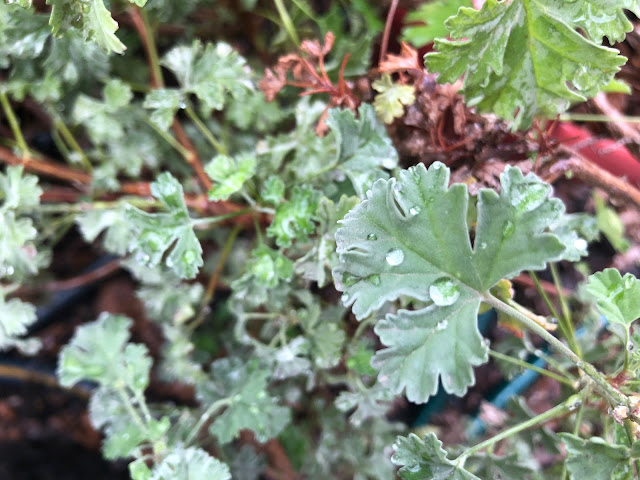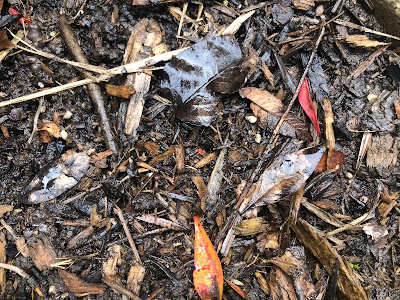
Succulents and other sensitive plants need storm protection

|
|
Pelargoniums, such as these scented geraniums, are among the types of plants
that are vulnerable to cold rains. Begonias, succulents and true geraniums are others. Protect or move them before the storm hits. (Photo: Kathy Morrison)
|
Santa is going to get soggy. So are your succulents.
Whoever asked for rain this Christmas is getting their wish fulfilled early. According to the National Weather Service, Sacramento is going to get a lot of moisture this week. Starting Tuesday, precipitation is in the forecast for seven consecutive days. Coincidentally, Tuesday is also the first day of winter.
These storms will start out easy, with hit or miss rain on Tuesday and Wednesday. The weather service estimates Sacramento will receive ½ to 1 inch total for those two days.
But Thursday through Saturday, Christmas Day, should see heavier rain with another 2 inches in the forecast. In addition, daytime temperatures are going to be chilly – mostly in the 40s. That’s well below this week’s average high of 56 degrees.
Prepare for these rainy days ahead:
* Clear any debris such as fallen leaves and twigs from storm drains and rain gutters.
* Watch out for spots where water may pool around your home – especially the foundation. Add extensions to downspouts so water is directed away from the house.
* Succulents can’t take a lot of cold water, and this rain will feel frigid. Cold or warm, too much rain and succulents will rot. Move potted plants to protected spots under eaves or on a covered patio.
* The same advice goes for begonias and geraniums/pelargoniums. If possible, give them some protection from these cold and soggy conditions.
* Remove any saucers under pots. Otherwise, roots may rot from standing in water.
* Protect holiday plants such as poinsettias and cyclamens. Although they need to be kept watered, they'll prefer a dry and bright spot indoors to the wet and cold outside.

|
| Soggy soil is bad for planting. Don't walk on it, either. |
* Avoid walking on very wet soil. It will compact, squeezing out its vital air pockets.
* Make a note of where water naturally flows in your landscape. You may want to create a rain garden and capture water from future storms.
Comments
0 comments have been posted.Sacramento Digs Gardening to your inbox.
Sites We Like
Garden Checklist for week of May 5
Survey your garden after the May 4 rainstorm. Heavy rain and gusty winds can break the neck of large flowers such as roses. Also:
* Keep an eye on new transplants or seedlings; they could take a pounding from the rain.
* Watch out for powdery mildew. Warmth following moist conditions can cause this fungal disease to “bloom,” too. If you see a leaf that looks like it’s dusted with powdered sugar, snip it off.
* After the storm, start setting out tomato transplants, but wait on the peppers and eggplants (they want warmer nights). Pinch off any flowers on new transplants to make them concentrate on establishing roots instead of setting premature fruit.
* Trim dead flowers but not leaves from spring-flowering bulbs such as daffodils and tulips. Those leaves gather energy to create next year's flowers. Also, give the bulbs a fertilizer boost after bloom.
* Pinch chrysanthemums back to 12 inches for fall flowers. Cut old stems to the ground.
* Mulch around plants to conserve moisture and control weeds.
* From seed, plant beans, beets, cantaloupes, carrots, corn, cucumbers, melons, pumpkins, radishes and squash.
* Plant onion sets.
* In the flower garden, plant seeds for asters, cosmos, celosia, marigolds, salvia, sunflowers and zinnias. Transplant petunias, zinnias, geraniums and other summer bloomers.
* Plant perennials and dahlia tubers for summer bloom.
* Don’t wait; plant summer bulbs, such as gladiolus and tuberous begonias.
* Harvest cabbage, lettuce, peas and green onions.